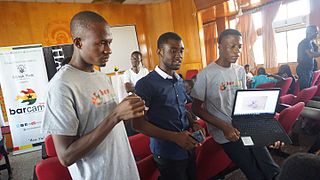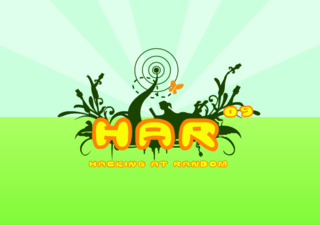
The Chaos Computer Club (CCC) is Europe's largest association of hackers with 7,700 registered members. Founded in 1981, the association is incorporated as an eingetragener Verein in Germany, with local chapters in various cities in Germany and the surrounding countries, particularly where there are German-speaking communities. Since 1985, some chapters in Switzerland have organized an independent sister association called the Chaos Computer Club Schweiz (CCC-CH) instead.

Herwart Holland-Moritz, known as Wau Holland, was a German computer security activist and journalist who in 1981 cofounded the Chaos Computer Club (CCC), one of the world's oldest hacking clubs.
Hack-Tic was a Dutch hacker magazine published between 1989 and 1994. It had a cult following and upset authorities beyond the Dutch borders.

The Chaos Communication Congress is an annual conference organized by the Chaos Computer Club. The congress features a variety of lectures and workshops on technical and political issues related to security, cryptography, privacy and online freedom of speech. It has taken place regularly at the end of the year since 1984, with the current date and duration established in 2005. It is considered one of the largest events of its kind, alongside DEF CON in Las Vegas.

The Hackers on Planet Earth (HOPE) conference series is a hacker convention sponsored by the security hacker magazine 2600: The Hacker Quarterly that until 2020 was typically held at Hotel Pennsylvania, in Manhattan, New York City.
The Freebox is an ADSL-VDSL-FTTH modem and a set-top box that the French Internet service provider named Free provides to its DSL-FTTH subscribers.

BarCamp is an international network of user-generated conferences primarily focused on technology and the web. They are open, participatory workshop-events, the content of which is provided by participants. The first BarCamps focused on early stage web applications, and were related to open-source technologies, social software, and open data formats.

SpeedTouch is the brand name of a line of networking equipment produced by Alcatel and Technicolor SA. Before 27 January 2010 Technicolor was known as Thomson SA.

Robbert (Rop) Valentijn Gonggrijp is a Dutch hacker and one of the founders of XS4ALL.
Mobile VoIP or simply mVoIP is an extension of mobility to a voice over IP network. Two types of communication are generally supported: cordless telephones using DECT or PCS protocols for short range or campus communications where all base stations are linked into the same LAN, and wider area communications using 3G or 4G protocols.

The Chaos Communication Camp is an international meeting of hackers that takes place every four years, organized by the Chaos Computer Club (CCC). So far all CCCamps have been held near Berlin, Germany.

The Metalab is a hackerspace in Vienna's central first district. Founded in 2006, it is a meeting place of the Viennese tech community, hosting events from cultural festivals to user groups. It has played a catalyst role in the global hackerspace movement and was the birthplace of several internet startup companies.

Hacking at Random was an outdoor hacker conference that took place in the Netherlands from August 13 to August 16, 2009. It had an attendance of 2300 people.

A computer security conference is a convention for individuals involved in computer security. They generally serve as meeting places for system and network administrators, hackers, and computer security experts.

Electromagnetic Field is a camping festival in the UK, held every two years, for hackers, geeks, engineers and scientists. It features talks and workshops covering a wide variety of topics. EMF is a non-profit event run entirely by a team of volunteers.

Observe. Hack. Make. also known as OHM, was an outdoor hacker conference that took place in the Netherlands from July 31 to August 4, 2013.
The quadrennial Dutch hacker convention is a hacker convention. It reoccurs every four years at different cities around the Netherlands. Nowadays, it was first held in 1989. In the past, it was organized by Hack-Tic magazine, and currently it is organized by the IFCAT Foundation.

Karsten Nohl is a German cryptography expert and hacker. His areas of research include Global System for Mobile Communications (GSM) security, radio-frequency identification (RFID) security, and privacy protection.

Still Hacking Anyway, abbreviated SHA2017, was a hacker conference and festival in The Netherlands. It is part of the quadrennial hacker camps that started in 1989 with the Galactic Hacker Party in Amsterdam.

The Datenklo (German) or data toilet is a portable toilet cubicle which has been re-purposed to provide connectivity at hacker camps. This typically includes Wi-Fi and wired communication such as Ethernet. A major event can be served by many data toilets: for example, in 1999 the Chaos Communication Camp had 17 booths.















